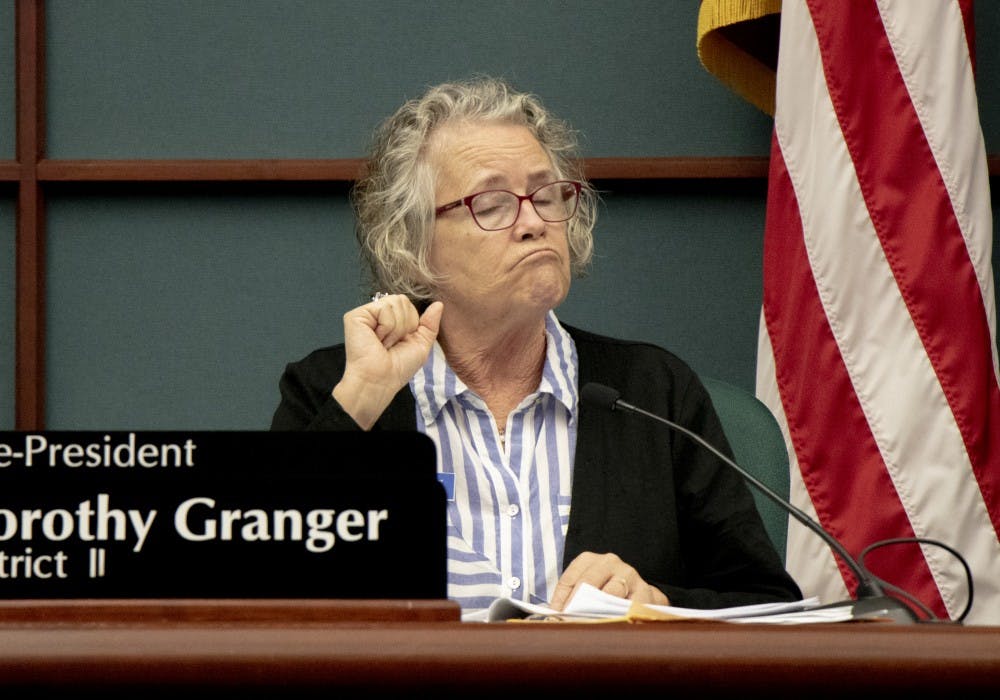The Bloomington City Council rejected an ordinance Wednesday night in a 5-3-1 vote for a new apartment complex development after some criticized the project for being disruptive and unnecessary.
Ordinance 19-12 would have rezoned almost four acres of the property at 1800 N. Walnut St., where a Motel 6 stands. The lot would’ve been converted from commercial land to a planned unit development. St. Louis-based Collegiate Development Group planned to build an apartment complex with room for about 750 people, complete with study rooms, an outdoor pool, fitness center and parking garage.
The company also planned to create a new Bloomington Transit bus route between the area and IU’s campus. If passed, the whole project would have cost $2.46 million.
For council member Dorothy Granger, the new apartment building replacing the Motel 6 was a fatal flaw.
“I take issue with the comment that the area is underutilized,” Granger said to Brandt Stiles, who represented the development company and presented the plans. “That really — I’m just going to say it — it pisses me off.”
Granger said the Motel 6 is where many homeless people live because it’s the cheapest place to live in the city. She said she had a problem with tearing it down and replacing it with apartments where one person would pay around $800 to $1,000 per month for rent. She said there should be a plan for Motel 6 residents before tearing it down.
Council member Andy Ruff said he had a similar position to Granger and was opposed to comparable projects such as the Evolve Bloomington apartment complex.
“There are ways that are much more Bloomington to meet our housing needs,” Ruff said. “I think Bloomingtonians are tired of this sort of thing.”
Ruff also said he was concerned about how the apartments would affect surrounding businesses.
“I’m worried it disadvantages smaller local businesses that have less financial clout,” he said.
Lance Furr owns Varsity Properties, which manages complexes such as Stadium Crossing, Varsity Court and Brownstone Terrace. He said the proposed complex would be anti-competition.
“It’s an unfair advantage that an out-of-town large company or developer can come in and put that money down,” Furr said.
Council member Isabel Piedmont-Smith said she didn’t want business to be “pay to play,” so the council would need to be careful about the decision. She opposed the building of another large apartment complex.
Council president Dave Rollo questioned the need for more student housing.
“That ambiguity bothers me,” Rollo said.
Rollo cited a decline in occupancy at other student-dominant housing options like Smallwood, as well as a decline in IU enrollment.
Council member Jim Sims said there was a need for more off-campus student housing. Sims said he worked at IU for 33 years, mainly in the Residential Programs and Services department. He said only about 17,000 students can be housed on campus in residence halls, on-campus apartments and greek houses.
“What do we do with the rest of them?” Sims said.
Council member Stephen Volan referenced Indiana Daily Student articles from various years reporting students having to live in dorms’ lounges.
“There were 8,200 freshmen in this year’s class,” he said. “That’s 200 of them living in lounges.”
Sims was one of the three council members who voted to approve the ordinance. He said IU will never have a problem with enrollment, and Bloomington needs to accommodate that at some point.
“We’re sadly mistaken if we think Bloomington is going to be the same as 40 or 10 years ago,” he said.
CORRECTION: A previous version of this article misidentified Brandt Stiles. The IDS regrets this error.




